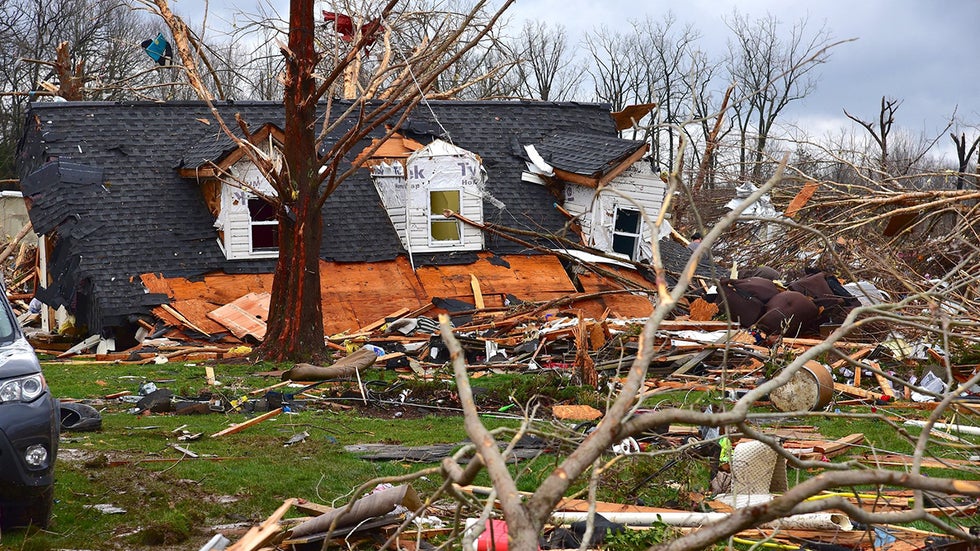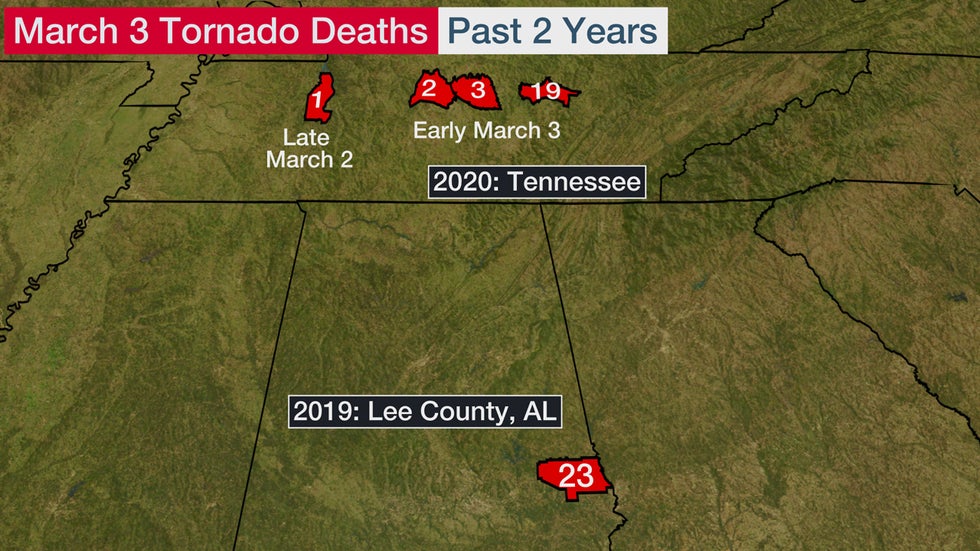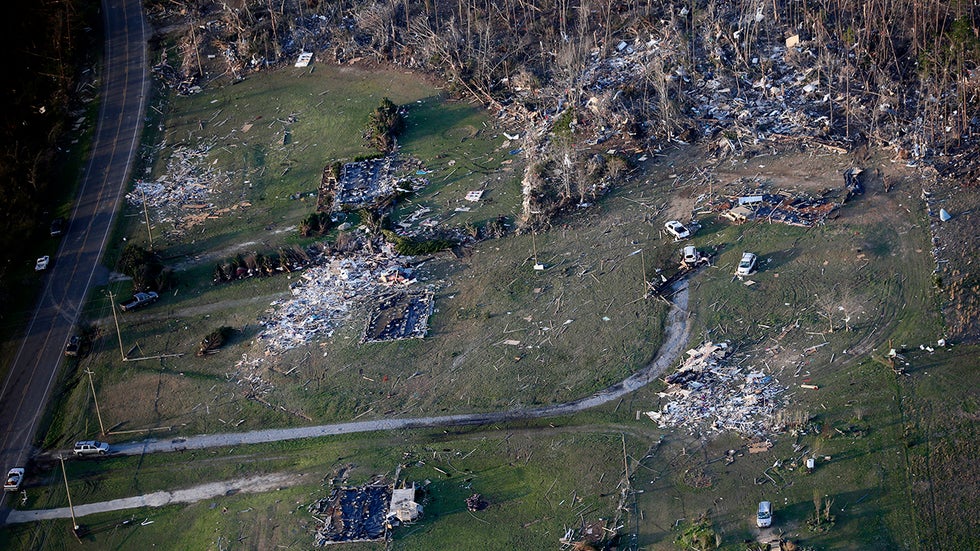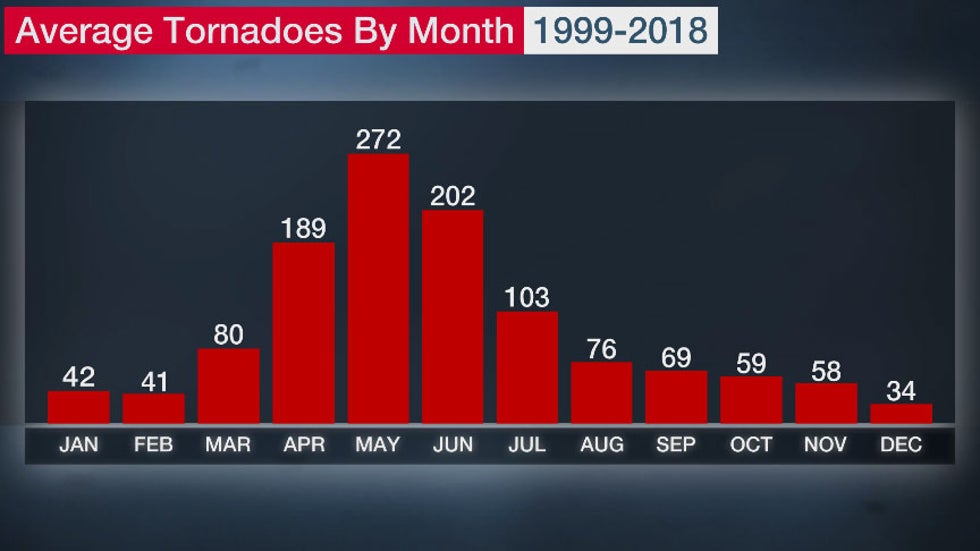Chris Dolce
March 3 has become a tragic day in tornado history in the last two years.
A combined nearly four dozen lives were lost on this date because of tornadoes in Tennessee in 2020 and Alabama in 2019. March 3 was also the single deadliest tornado day for all of the United States in both years.
Here's more on these March 3 tragedies.
2020 Tennessee Outbreak
Tennessee was hit by 10 nighttime tornadoes from late March 2 into the early morning of March 3 last year. Three of those twisters were deadly and claimed a total of 25 lives.
The terrible night began when one person was killed by an EF2 tornado in Benton County late on March 2.
Five additional lives were lost after midnight on March 3 when an EF3-rated tornado tracked 60 miles from Nashville to areas east of there in Wilson and Smith counties. Two of the deaths occurred in Nashville and another three lives were lost in Wilson County.
The most violent tornado was an EF4 that struck Putnam County, or just to the west of Cookeville, right before 2 a.m., local time. A total of 19 people lost their lives in that twister alone.
 A destroyed home in Cookeville, Tennessee, after the March 3, 2020, EF4 tornado.
A destroyed home in Cookeville, Tennessee, after the March 3, 2020, EF4 tornado.This was the deadliest tornado outbreak in Tennessee since April 27, 2011, when 31 were killed in the state.
These high-impact tornadoes also struck on a night when severe weather was not particularly widespread. This once again illustrates that you should never let your guard down, even on days when the threat of severe weather is not at extreme levels, as we've already seen twice in 2021.
(MORE: Two Deadly Tornadoes in 2021 Occurred Without a Major Severe Weather Outbreak)
 Tornado deaths for the affected counties on March 3 in 2020 and 2019.
Tornado deaths for the affected counties on March 3 in 2020 and 2019.2019 Alabama Long-Track Tornado
An outbreak of severe thunderstorms on March 3, 2019, spawned dozens of tornadoes from the Florida Panhandle into southern and central parts of Alabama, Georgia and South Carolina.
The most intense tornado in this outbreak covered a distance of 68.8 miles as it moved from east-central Alabama into west-central Georgia. It reached a maximum intensity of EF4 in Lee County, Alabama, where the twister claimed 23 lives.
Homes were flattened and vehicles tossed by the violent tornado, which had maximum estimated winds of 170 mph.
 Damage from the March 3, 2019, EF4 tornado in Lee County, Alabama.
Damage from the March 3, 2019, EF4 tornado in Lee County, Alabama.This was the single deadliest tornado anywhere in the United States since the Moore, Oklahoma, EF5 killed 24 people on May 20, 2013.
The good news is we don't expect a repeat of these events on March 3 of this year. Atmospheric conditions are not forecast to be conducive for tornado formation across the United States on Wednesday.
Tornadoes can strike any time of year, but March typically marks the beginning of the more active spring season. April, May and June are, on average, the most tornadic months of the year.

Here are some practical steps you can take to be ready ahead of the next severe weather threat.
-Before severe weather strikes, know where to seek shelter so you can get there quickly, even in the middle of the night. This is particularly important if you live in a mobile home. You probably will need to leave a mobile home for either a community storm shelter or another building.
-Take every forecast, watch or warning about severe weather seriously, particularly if it is forecast overnight. It only takes one tornado or severe thunderstorm capable of, for example, downing a tree on your home, to pose a danger.
-Have multiple ways to receive severe weather watches and warnings. This could include a NOAA weather radio or your smartphone, which can sound an alarm to wake you at night when a severe weather alert is issued for your area. These alerts could provide the precious minutes needed to move quickly to shelter and may save your life.
The Weather Company’s primary journalistic mission is to report on breaking weather news, the environment and the importance of science to our lives. This story does not necessarily represent the position of our parent company, IBM.
The Weather Company’s primary journalistic mission is to report on breaking weather news, the environment and the importance of science to our lives. This story does not necessarily represent the position of our parent company, IBM.

No comments:
Post a Comment